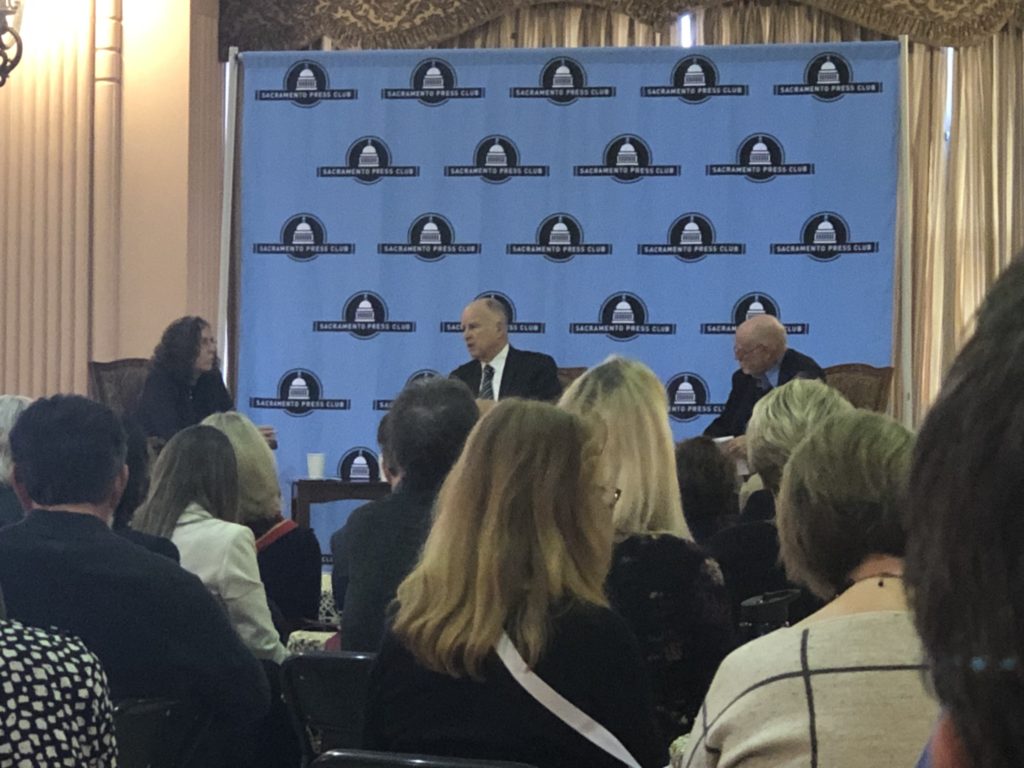Gov. Jerry Brown was once described by my former boss, Connie Conway, as the “funniest unfunny man” she’d ever met.
For anyone who had the opportunity to watch his “exit interview” at the Sacramento Press Club, you’d know that this is an apt description.
 When asked to make a particularly newsworthy response to a question about one of the Gov’s priorities, he told the crowd, “I’m not here to make news . . . I’m here to enlighten.”
When asked to make a particularly newsworthy response to a question about one of the Gov’s priorities, he told the crowd, “I’m not here to make news . . . I’m here to enlighten.”
When asked what he learned from his tenure as Mayor of Oakland, he said that he was amazed that so many people routinely showed up to argue for the stupidest things.
He lectured a reporter that he was taught in his faith that pride was a sin, when asked what he was most proud of as Governor. True to form, he rattled off half a dozen unresolved issues that require attention in the coming years as what he’s most focused on.
On his policy agenda, Brown showed no signs of slowing down as the clock ticks down toward Gov.-Elect Newsom’s inauguration on Jan. 7.
Asked about the future of the High-Speed Rail, he said that both would be built in his successor’s term in office (I, at least, found this answer to be funny). He even pitched high-speed rail as better than air travel because, “you can have a cocktail, you can walk around and shake hands.”
Validating my recent hypothesis, he said that the federal government usually funds at least 50 percent of big state infrastructure projects, and that the state should look to incoming Nancy Pelosi to get $3 -4 billion to fund the Bay Area – Central Valley leg of the project in a potential infrastructure deal with President Trump.
Eccentricities aside, how should fiscal conservatives evaluate Brown’s tenure as Governor?
To be sure, Brown has certainly increased state spending to record levels, took the state “all in” on Obamacare and expanding Medicaid, and obsessed on pet projects like high-speed rail. He pushed for the “temporary” Prop. 30 tax increases to protect education from painful “trigger cuts” that he proposed to scare voters if they didn’t approve the tax. This is even though revenue grew significantly throughout the decade, making the tax unnecessary to secure enough revenue to protect education funding.
But Brown also joined with Legislative Republicans to enact a rainy day fund that has led to billions being socked away to prevent painful cuts in the next economic downturn. Throughout his second governorship, he was also steadfast in rejecting one-time funds to pay for new, ongoing programs. And he took heat from unions for demanding fiscally-responsible pension reforms and fighting to protect them in court (PRI has filed an amicus brief in that case.)
So, as he prepares to leave, we salute Gov. Brown for his decades of public service, and for enlightening Sacramento lawmakers – if only rhetorically on most occasions – about the importance of adhering to fiscal discipline.
Tim Anaya is the Pacific Research Institute’s communications director.
